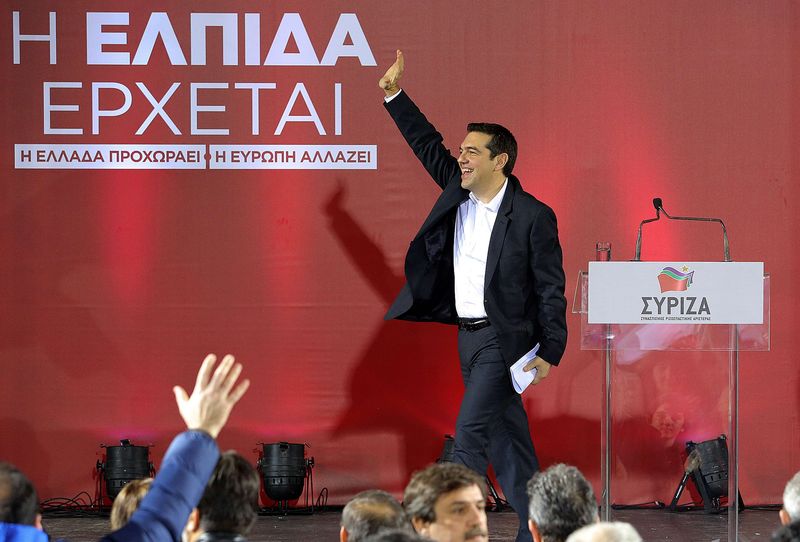By Renee Maltezou
ATHENS (Reuters) - Greece's leftist Syria party held onto its opinion poll lead on Friday as it campaigns to form the first euro zone government committed to scrapping austerity outright after elections this weekend.
With the fate of Greece's 240-billion-euro bailout from the European Union and IMF unclear, Syriza leader Alexis Tsipras rejected any suggestion that Athens was under pressure to come to terms with its creditors by the end of next month.
All polls show Syriza in the lead and inching towards the numbers needed for outright victory as its message of cancelling austerity and securing a debt write-off attracts Greeks hit by four years of wage and pension cuts.
"Light has won over darkness. Victory and a majority are within our grasp," Tsipras told supporters at his final campaign rally in Crete.
Among the final surveys published before Sunday's snap election, two showed Syriza's lead over the conservative New Democracy Party of Prime Minister Antonis Samaras widening, while another showed it narrowing slightly.
According to an Alco poll, Syriza has 32.9 percent support, giving it a 6.6 point lead - up from 5.2 points in a survey by the same pollster on Wednesday. Surveys by Kapa research and MRB for Star TV put the difference between the parties at 2.9 and 5.2 points respectively.
Greece took the bailout in two stages from 2010 after plunging into a debt crisis which took it to the brink of bankruptcy, casting doubt on its membership of the euro zone and the very future of the monetary union.
The economy has pulled out of its free-fall but the chance of a victory by Syriza has again raised tensions on financial markets and with other euro zone governments. While some European leaders have called for policies promoting growth, they have not done away entirely with austerity as Syriza promises to do.
In Brussels, a senior euro zone official said Athens would have to ask for a new extension to its euro zone bailout program before 1.8 billion euros in aid can be paid, and stressed a new government must first be in place to do so.
Greece's program with the euro zone expires on Feb. 28. Although the IMF will continue to back Athens, the country needs to be under a European accord to receive the final euro zone loans and to be eligible for support from the European Central Bank.
Tsipras dismissed suggestions that Athens had to complete a bailout review by then, saying a government led by his party would have until July to negotiate with its creditors.
On the final day of campaigning, he said a plan by the ECB to boost the euro zone economy by buying government bonds set the timeframe for the talks. Greece will not be eligible for the ECB program, unveiled on Thursday, until July.
"Yesterday's announcement sets the timeframe for the negotiations and this timeframe is by July - the same timeframe we have set - and not Feb. 28," he told a news conference. "I'm certain by then we will have found a viable, mutually acceptable solution."
It remains unclear how a Syriza-led government would be able to ensure Greek banks have access to ECB funding and its bond-buying after Feb. 28 in such a case, given that both are dependent on Greece staying under a supervised aid program.
The euro zone official said finance ministers from the bloc would discuss funding for Greece in Brussels on Monday and were expected to signal they are willing to give Athens more time under the program that was originally due to expire at the end of last year.
"Another extension may need to be considered," the official said. "A precondition for such an extension is that you have to ask for it."
Syriza officials have said they will seek a few months of "breathing room" while they restart negotiations from scratch. One senior party official told Reuters: "We are asking for more time, not an extension of the existing program."
OFF TO CYPRUS
Syriza would have to win 40 percent of the vote on Sunday to be confident of governing alone. But the electoral arithmetic is complicated and it could scrape into power with less, depending on the fate of smaller parties which must win three percent of the vote to get into parliament. Without an overall majority, Syriza would have to seek coalition partners.
Many investors and policymakers are betting on compromise with the euro zone. Despite the uncertainty that might mark the initial days after the election, they believe Greece's new government and its creditors will find common ground.
"Once politicians move from being candidates to being members of government, they acquire an additional perspective," said Italy's Economy Minister Pier Carlo Padoan in an interview at the World Economic Forum in Davos.
Padoan said any future Greek government would understand "that we need, in Greece and in Europe, a cooperative solution."
Speaking at the Forum on Tuesday, Finnish Prime Minister Alexander Stubb said Greece could be given breathing space. "It will be very difficult for us to forgive any loans or restructure any debt at this particular moment," he said, but added: "We can look at different kinds of extensions."
Tsipras has been coy about plans for his initial days in power, pointing only to a manifesto promising everything from reversing cuts to the minimum wage to reversing unpopular taxes.

Tsipras added that he would travel to fellow bailed-out nation Cyprus on his first foreign visit if elected.